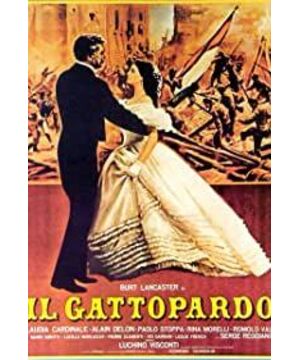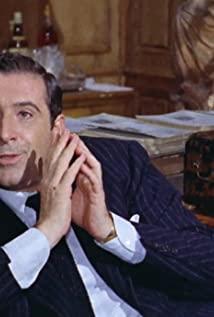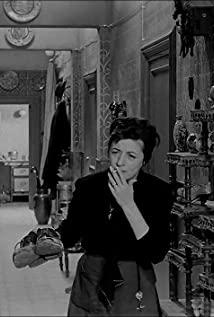In April 1860, a peasant uprising broke out in Sicily, Italy, but it was brutally suppressed by government forces. The young Italian party member Garibal heard the news and led a thousand volunteers in red shirts to help. He landed in Marsala, Sicily, and won the first battle, which greatly inspired the people of Sicily. Garibal advances by victory, and soon the whole of Sicily is liberated, and the Bourbon regime is destroyed.
Due to his legendary character, Garibal's has been put on the screen by the Italian and American film circles. However, most of these films focus on the legendary stories of Garibal. Coupled with a bit of emotional drama, almost no film has taken an extremely unique approach to Garibal like Visconti. Performance perspective.
In this film, Visconti only puts the activities of Garibal's red shirt party members in the background as a wedge, and never gave him any legendary color. As a realistic film director, Visconti was able to view the great impetus of Garibal's struggles to the social changes in Italy at that time from a historical perspective.
Regardless of the country’s film industry, when dealing with historical themes, it always encounters the problem of "using history to lead people" or "using people to lead history". In the West, the film industry generally adopts the expression method of "using people to lead history", and what viewpoint to adopt to write history is a key issue. In many western historical films, one can often see the interpretation of history from the viewpoint of historical idealism, or the expression of "regular history" as "unofficial history." The uniqueness of the film "Leopard" is that the author Visconti strives to treat the characters and the history of their activities from the viewpoint of historical materialism. The film author obviously wants to use Prince Salina’s character, mentality and experience to point out that the feudal forces in Sicily must be replaced by emerging capitalist forces; as the core of the feudal system-the aristocracy will inevitably be regarded as a class in politics The eradication of the stage is a historical necessity and an irreversible historical trend.
Under such a major historical premise, Visconti expresses the inevitable development of this historical stage from the character and mentality of the characters. It can also be said that he tried to treat this event through the eyes and personal feelings of Prince Salina. The social changes that shocked Italy. Prince Salina was an arrogant, powerful and powerful ruler like his clan emblem-the "Leopard". He regards the priest who represents the power of the church as a "follower," and his wife as a fertility machine and a tool for venting desires. He is a tyrant who speaks no difference. However, when he saw his beloved nephew, Don Creddy, publicly announced that he would go to Garibal so that he could "return the carbine" when the republic was established, Prince Salina had already felt the message that the times were about to change. However, as a representative of a class, he is inextricably linked with the old dynasty, and he is nostalgic for the past, he will struggle, and he will also have fierce ideological contradictions. Visconti knows that, as the aristocratic class, the most emphasis is undoubtedly the majesty, and this majesty can be embodied by the etiquette that pays attention to "grand", and it can also be revealed in the behavior that prevails in daily life. Therefore, a scene was added: After learning of Garibal's landing in Sicily, Prince Salina wept loudly in spite of Princess Stella's cry, and at the time of war and chaos, he openly took the priest and went to the city to engage in prostitutes. Through this scene, Visconti reveals the mentality of Prince Salina at this moment: He just wants to vent his desires in front of the priest who represents the power of the church, to show that he is still a figure above religion. In the ball scene that occupies an important position in the film, Visconti also treated the ball scene as a face-to-face contest between the feudal aristocracy and the emerging bourgeoisie. He let Prince Salina see with his own eyes the youthful vitality of Angelica, daughter of the newly appointed mayor Serrada, the representative of the emerging bourgeoisie, her beauty, and her charm. In the face of this kind of performance, Salina The prince couldn’t help making two comparisons: first, a wife whose birth and status was equal to him. In contrast, she became a stupid and invigorating woman. She was even a symbol of some old ethics, because he and his wife After being married for many years, he "never saw her belly button", he began to deepen his disgust; secondly, when he compared himself with Angelica, he had to admit that everything about him was difficult to match. Rival. If Prince Salina treated Angelica's father with a certain contempt, he would "sigh from the bottom of his heart" to Angelica. This self-confidence failure is not limited to physical comparisons, but mainly psychological, that is to say, from the psychological sense of loneliness and loneliness to political loss, so he voluntarily withdrew from the dance party and hid.
Visconti also used the same attitude to show the other two important figures in the film "Leopard": Angelica and Tangcredi.
In Salina's eyes, Angelica is a symbol of beauty and new vitality, but her beauty is not purely from her appearance, but mainly a quality manifested after receiving a new education from Florence. For Don Creddy, Visconti emphasized his political speculation through his abandoning his cousin who was right in the house and was eager to marry Angelica, which gave him a greater guarantee for his further refuge in the emerging bourgeoisie.
The film "Leopard" is based on the novel of the same name by the Italian aristocratic writer Lampedusa, but Visconti has made some necessary changes. First, he added the plot of Prince Salina, who was panicking and crying during the war, and took the priest to prostitute. Secondly, in the original work, Princess Stella was jealous and often hysterical and neurotic. A woman, but in the film, Visconti shows this woman more as a representative of the old-fashioned, conservative, and stupid old ethics, which makes it even more difficult for her to be the same as Angelica, who represents youth and vitality. By comparison, the “feeling of loss” of Prince Salina has been strengthened.
The famous Italian film critic Rondolini called "Leopard" "an excellent (Italian) historical mural". This is due to the solid foundation of the original work, but it also clearly penetrated into Visconti’s experience with him. The sense of history that the subordinate aristocratic class will be destroyed. The international film critics said that "Leopard" is a powerful and powerful film made with his mind, and there is some truth in it.
View more about The Leopard reviews











